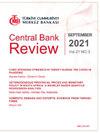The impact of temperature and precipitation on wheat production in Türkiye
IF 1.2
Q2 ECONOMICS
引用次数: 0
Abstract
It is now a well-known fact that climate is changing globally at an unprecedented rate and agriculture is one of the most vulnerable sectors to this change. Considered as a significant threat for food security, climate change and its impact on agricultural practices are among the most prominent topics in the recent economic literature. Given its significant contribution to employment, exports and national income, agricultural production-climate change relation is considerably crucial for the Turkish economy. In this paper, we investigate the impact of climate change on wheat production at the province-level with a unique, up-to-date and comprehensive dataset that is constructed by the Central Bank of the Republic of Türkiye (CBRT) under the Early Warning System Project (EWSP). In the corresponding models, climate change is initially considered in a conventional way via temperature and precipitation measures, later considered with new alternative composite climate indicators. The estimation results obtained from models with two different alternative climate measures are comparable and similar: Climate change has a statistically significant adverse impact on wheat production. Combining model estimation results with the climate scenarios, the impact of hotter springs and summers on wheat production for different time spans has been put forward. The impact is found to be increasing over time, regardless severity of the climate scenarios. We believe that our understanding regarding climate change-agricultural production relation will improve with the advancements of the data set, and this will support the development of more efficient policy recommendations.
温度和降水对新疆小麦生产的影响
众所周知,全球气候正在以前所未有的速度变化,而农业是最容易受到这种变化影响的部门之一。气候变化被认为是对粮食安全的重大威胁,它对农业实践的影响是最近经济文献中最突出的主题之一。鉴于农业生产对就业、出口和国民收入的重大贡献,农业生产与气候变化的关系对土耳其经济至关重要。在本文中,我们利用基伊共和国中央银行(CBRT)在预警系统项目(EWSP)下构建的独特、最新和全面的数据集,研究了气候变化对省级小麦生产的影响。在相应的模式中,气候变化最初以传统方式通过温度和降水测量来考虑,后来用新的替代复合气候指标来考虑。采用两种不同备选气候措施的模型得到的估算结果具有可比性和相似性:气候变化对小麦生产具有统计上显著的不利影响。结合模型估算结果和气候情景,提出了不同时间跨度春夏气候变暖对小麦产量的影响。研究发现,无论气候情景的严重程度如何,这种影响都会随着时间的推移而增加。我们相信,随着数据集的完善,我们对气候变化与农业生产关系的理解将会提高,这将有助于制定更有效的政策建议。
本文章由计算机程序翻译,如有差异,请以英文原文为准。
求助全文
约1分钟内获得全文
求助全文

 求助内容:
求助内容: 应助结果提醒方式:
应助结果提醒方式:


